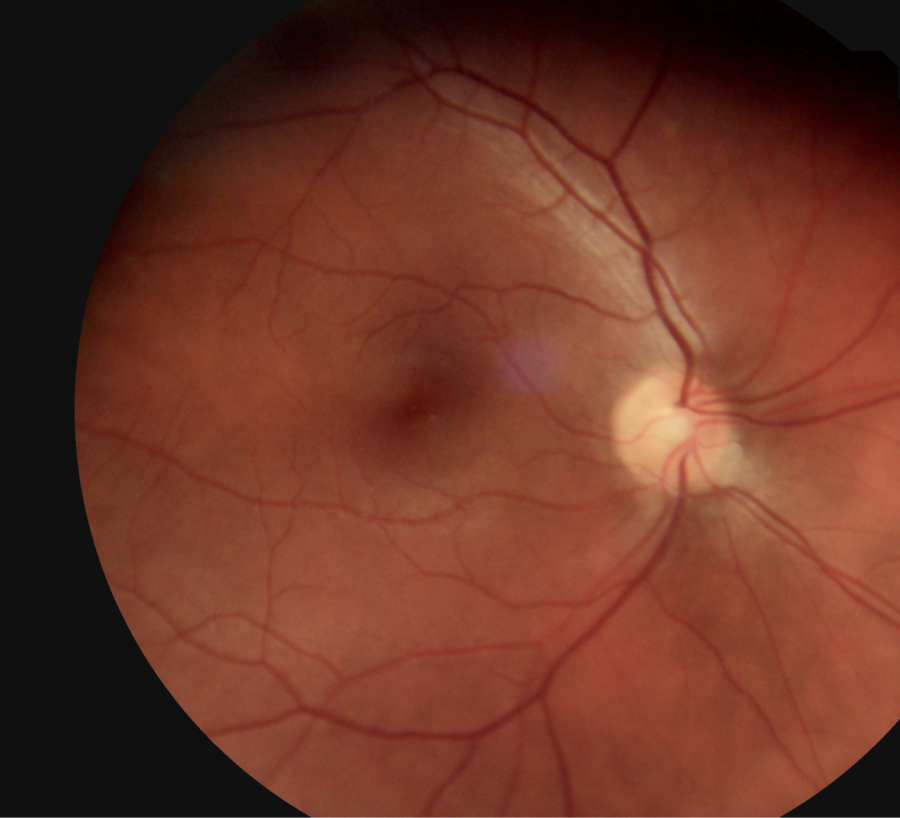Blog post
Central Serous Retinopathy: Signs, Symptoms, Causes and Treatments

Matthew Burford BSc(Hons) Optometry MCOptom - Domiciliary Optician and Professional Services Manager at OutsideClinic
6 minute read time
What is central serous retinopathy?
Central serous retinopathy (CSR) is an eye condition where fluid builds up under the retina, the light-sensitive layer at the back of the eye.
It typically affects adults between the ages of 20 and 50 and is more common in men than women.
Is central serous retinopathy serious?
While CSR is unlikely to cause complete blindness, it can lead to significant vision impairment if not properly managed.
CSR can last from a few weeks to several months. While many cases resolve on their own, some can lead to persistent vision problems.
Persistent or recurrent CSR can cause permanent damage to the retina.
What are the signs and symptoms of central serous retinopathy?
Symptoms of CSR can vary but often include:
- Blurred or distorted vision
- Dark spots in the central vision
- A central blind spot
- Straight lines appearing wavy
- Difficulty with fine details or reading

What causes central serous retinopathy?
The exact cause of CSR is unknown, however risk factors include:
- High stress levels: Stress is a significant risk factor for CSR. Managing stress through relaxation techniques and lifestyle changes can help reduce the risk.
- Steroid medication use: Prolonged use of corticosteroids increases the risk of developing CSR.
- Hypertension: High blood pressure is associated with an increased risk of CSR.
- Type A personality: Individuals with a highly competitive, high-stress personality type are more prone to developing CSR.
- Excessive alcohol consumption: Excessive alcohol consumption may exacerbate CSR symptoms due to its impact on overall health. Moderation is key to managing the condition.
- High caffeine intake: High caffeine intake has been suggested as a potential risk factor for CSR. Reducing caffeine might help in managing the condition.

How is central serous retinopathy diagnosed?
CSR is initially identified through a comprehensive eye exam.
Here at OutsideClinic, if further tests are needed, the Optometrist will refer you for optical coherence tomography (OCT) and fluorescein angiography.
OCT provides detailed images of the retina, while fluorescein angiography uses a dye to highlight any leaks in the blood vessels.

What’s the treatment for central serous retinopathy?
Treatment options vary based on the severity and duration of CSR. In some cases, no treatment is needed, and the condition resolves on its own.
Medications can be used to prevent new blood vessel growth and diuretics can help reduce fluid.
For more persistent cases, laser treatment is sometimes recommended. Laser treatment can help seal the leak in the retina, reducing fluid build up.
Recovery from laser treatment is typically quick, with most patients experiencing improvement in vision within weeks.
Treatment for CSR, including laser treatment, is available on the NHS.
Can diet and exercise help with central serous retinopathy?
A healthy diet rich in leafy greens, fish, and nuts can support overall eye health. And moderate exercise can reduce stress which is a known risk factor for CSR.
While diet and exercise won't directly treat CSR, maintaining a healthy lifestyle and balanced diet can support overall eye health and can help manage symptoms.

Can you fly with central serous retinopathy?
Flying with CSR is generally safe, but it's best to consult with your optometrist or GP.
Is central serous retinopathy a disability?
While not typically classified as a disability, severe cases might qualify for certain accommodations.
Our team at OutsideClinic can help assess the impact of CSR on your vision and daily life.
What support is available?
The Macular Society offers comprehensive support for individuals affected by macular disease through a variety of services:
- Advice and Information Service: Accessible via phone (0300 3030 111) or email (help@macularsociety.org), providing expert guidance on managing macular conditions.
- Online Resources: The society's website (macularsociety.org) features a wealth of information and resources to help individuals understand and cope with macular disease.
- Peer Support Groups: Over 300 groups across the UK offer emotional and practical support, allowing people to connect with others facing similar challenges.
- Counselling and Befriending Services: Free, confidential counselling and regular friendly phone conversations through the Telephone Befriending Service help reduce feelings of isolation.
- Treatment Buddies and Skills Training: Connects individuals with experienced peers for support during treatment and offers training to enhance visual skills.
These services are designed to provide practical help and emotional support to enhance the quality of life for those living with macular conditions.

By Matthew Burford BSc(Hons) Optometry MCOptom - Domiciliary Optician and Professional Services Manager at OutsideClinic Post last updated 4th November 2025
Matthew graduated from Aston University in 2004 with a degree in Optometry.



